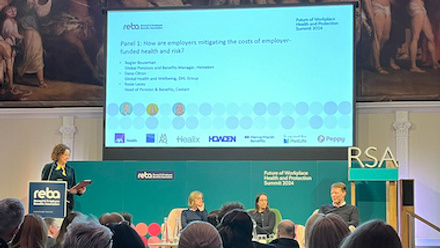RebaLINK: group income protection and the SPA
Question: Under our Group Income Protection scheme, the payment period is currently up to State Pension Age (SPA). I'm looking to find out whether many companies have changed this to a fixed number of years?

There were a range of responses to this question, highlighting that the approach to this benefit is very much dependent on the organisation. However, several people noted that they too often consider whether to change the payment period.
We offer income protection to state retirement age too, and each renewal consider whether we should reduce it to a maximum of five years, although we have not yet made the change. I would prefer to implement some sort of cost sharing with employees instead of reducing the term (assuming cost is the driver).
Another Professional Member noted that they had taken this cost sharing approach:
We have a standard fixed period of five years at 50% of pay. We offer employees via our flex benefits offering the opportunity to flex this up to somewhere between 50% and 90% of pay for the five years or keep it at 50% but extend to state retirement age.
Others spoke about what was right culturally in their organisation and how they had previously managed rising costs:
Our policy was to age 65 but we amended it to state pension age a couple of years of ago; after two years continuous of absence we move the employee to pay direct with the insurer so they come off our books. Between 2004 and 2011 our GIP policy was only for five years due to poor claims history (before it was to age 65) as we had to manage costs. It wasn't a comfortable position to be in to then terminate an employee unable to work but who was unlikely to meet pension disability requirements. We worked hard to get claims down and were able to move back to age 65 in 2011. Now with COVID-19 and cost considerations, we may have to review again. I'm not comfortable with a five year term and would rather look at a salary or benefit cap to help manage costs but I think we'd be unusual going down this route, ie five year terms seem to be on the increase.
This paternal approach was more unusual among those Members who responded to the question. Most stated that they had a fixed payment period of five years, with some paying 50%, while other policies were more generous. One member noted that their broker had advised that most new policies do go for a fixed period.
One respondent suggested implementing a different policy for new starters:
We implemented an income protection scheme later than most and as such made it for a short-term fixed period as that was more common by 2013. Every few years we review it to ensure it's still fit for purpose. Having a 'til retirement' policy seems out of line with what's currently being offered but indeed hard to move away from. Maybe a new joiner shorter term scheme would be a good option to consider.
Introducing different terms for new starters was something that a further respondent had already done. However, they noted that there were still issues with going down this path:
We reduced the term to three years for new starters about 10 years ago. Legacy terms to 60/65 were preserved (at increased flex rate) and we still have several people with that in place. However, this drives the unit cost up for everyone – it’s not as simple as employee flexing to 60/65 pays the additional cost via flex. We are about to start a piece of work to review scheme design and potentially remove the legacy benefits and/or make other changes to make the scheme sustainable long term.
The range of responses to this question highlight just how many options there are when it comes to limiting the payment period in group insurance products. Thank you to all those who took the time to respond to REBA’s growing community of Reward Professionals.
The author is Dawn Lewis, content editor at REBA.
REBA Professional Members can access rebaLINK via our website. It is a confidential forum for industry peers to ask questions about policies, suppliers and wider reward practices both for the UK and internationally. It provides access to a collective body of industry professionals and their expert knowledge.






